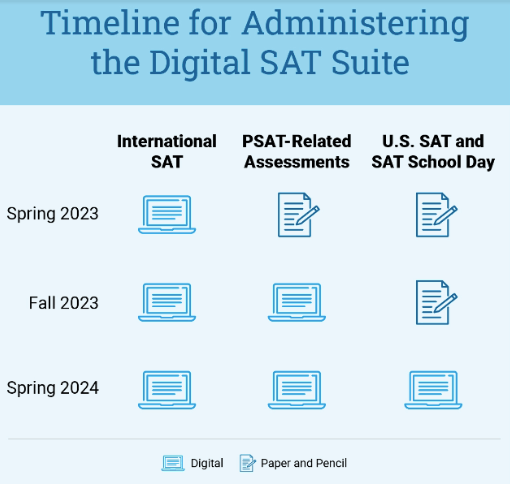Alexandra Gobran ‘23 | Gray Collins ‘25
College counseling and standardized testing at EA are both transforming this school year in order to more effectively aid students in the college application process.
In terms of college counseling, the department outgrew the previous office located across from the dining hall. The team added two new college counselors. Cynthia Crum, Director of College Counseling, says, “Ms. Valenzuela joined us. We are happy to have her as part of the team. We also had Mrs. Kobosky join us.”
Members across the Episcopal community are supportive of these new hires. Clare Collins ‘23 comments, “I think the expansion of the college counseling office is beneficial to both the students and the college counselors.” She adds, “The students will now receive more feedback and dedicated time with the counselors. The college counselors will have less of a workload and really get to know everyone that they are advising on a deeper level.”
This viewpoint is mirrored by other staff. Carly Valenzuela, a new Associate Director of College Counseling, states, “I would say that by having more college counselors, we are able to provide students with additional support. They always have incredible resources as a result of our experienced staff members, but having more college counselors allows us to have more time with students and provide you with additional services.”

Photo courtesy of QuestBridge
Michael Letts, Head of the Upper School, reciprocates this sentiment, saying, “We want to make sure that we are giving as much one on one time to our students and families as we possibly can, so increasing the number of counselors in the office obviously does that. The ratio of students to counselors has gone down again, and I think that’s critically important.”
Due to this increase in college counselors, the department needed a larger physical office space. The school took to careful planning in order to determine the best location for the new office. Crum recollects, “Dr. Locke, Mr. Torino, Mr. Notaro, and Mr. Letts spent a long time looking all over campus for where they could put us.”
The department believes that the actual space of the office is crucial in offering students the support they need when undergoing the admissions process. Crum explains that, before the COVID-19 pandemic, “the lobby was filled with kids, hanging out or studying.” The new office is on the second floor of the library, and college counseling thinks that it mimics the vibrant nature of their previous space, which is now the new DEI office. Crum remarks, “The foot traffic has been amazing. That’s why we are there: to provide a place for people to work and a place for students to feel really comfortable, to come in and ask questions and find out things. It might not be about college, it might be about something completely different.”

Photo courtesy of Gianna Trala ‘23
The college counseling department has had a positive experience with the move and feels as though the new office is an area where students can collaborate on projects, have a dialogue with a counselor, or just hang out. Crum reflects positively on the move in saying, “This is really fun for us. We have the space for them to be able to do that, for us to spend time with students, and get to know them. This is also our work with you all, not just college but who you are. We like to know you as people so to have the space to do that is really important for us.”
Gaeli Keffer-Scharpf ‘23 agrees with Crum’s outlook on the change of environment, saying, “I really like how the new office feels. I think that the location fosters an open and productive space that has helped me this year as I go through the college application process.”
In addition to the changes with college counseling, standardized testing at EA is also evolving. For the first time, digital PSATs will be administered to freshmen and sophomores this year.
The SAT and the PSAT, staples of the high school experience since the middle of the 20th century, will transition from the traditional paper booklet format to a new entirely digital assessment. Letts relayed these changes in a recent email to the school community, stating, “In the past, our students took the exam in much the same way we did – in a paper booklet over a 3.5-hour period. However, the College Board announced this past January that beginning in the fall of 2023, all PSATs will be administered as digital, adaptive assessments, and starting in March 2024, all SATs will be digital, adaptive exams.” As a result, he explains that the “traditional, on-paper assessment will no longer be an option.”

Photo courtesy of College Board
Some students have reacted positively to this news. Rohan Dalal ‘25 states, “I think that this change is favorable, as many of my exams at EA have been in the online format as well. I think it would be nice if more EA’s teachers make their exams online, given the SAT’s new changes.”
Crum anticipates a broad digital migration across many different areas in education. She notes, “This is the way the SAT is headed, AP, ACT, the world is going digital.” Collins agrees, saying, “I think the digital PSAT is a drastic change that requires a lot of adjustment from the students, but I think it reflects how the modern world is becoming more and more reliant on technology.”
While the entire country is adapting to this new test, EA’s administration believes that their preparation plan for these new exams will set them apart from other schools. The Compass Education Group digital PSAT that EA will be offering students this year is playing a major role in the transition.
Letts believes that “offering this simulated digital PSAT to our ninth and tenth grade students provides them with a unique opportunity to prepare them for their future PSAT and SAT assessments in a far better way than providing them with the traditional format only to have the assessment fundamentally change next year.”
The freshmen and sophomores will take this digital test on October 12. In terms of the National Merit opportunities provided by the PSAT, this year’s juniors will earn those accolades through the traditional paper test. Starting next fall, National Merit will be determined by the results of the digital PSAT, which freshmen and sophomores are practicing for this year.
EA determined that the Compass Education Group digital PSAT was the best way to prepare students for the future through an in-depth vetting process. Letts explains why EA is looking to a third party for a PSAT, sharing, “The College Board is not actually offering a digital practice SAT until they completely roll it out next year.”
EA began talks with the Compass Education Group over the summer. Letts explains, “Compass Education Group approached us, and we’ve worked with them in the past. I’m confident that it is a really good assessment.” Crum adds, “We really wanted to get in front of this. Compass was prepared to do that for us. They designed a tool that will very much mimic the actual PSAT that students take. They have been a great partner of EA for the last couple of years, and they are a great test prep company.”
A major factor that differentiates the Compass PSAT from examinations EA students have taken before is adaptive testing. Letts elaborates on this concept, stating, “The test itself is a modified assessment. Everybody takes the first section and, based on how you perform in real time, it will then, for the second section, push you into harder questions or not as difficult questions. If you go the harder route, then the questions you get right get scored at a higher level.” Crum believes that the main purpose of adaptive testing is to “give students questions that are appropriately challenging.” This adaptive format makes the test an hour shorter.
The data and analysis provided after students take the Compass test is vastly better than that of the College Board PSATs in the past. Crum says, “The biggest difference, Compass is going to give families answers back that same day.”
This dramatically reduced turnaround time is not the only benefit of the Compass feedback. The Compass test also gives students the opportunity to analyze a variety of different aspects of their tests. Letts notes, “It will dive into things as deep as how long you took on every question. You will get the actual questions that you got wrong. You’ll see those, in the PSAT you don’t see any of that data. When you get the scores from the College Board, they don’t tell you which questions you got wrong.”
The college counseling office believes that the comprehensive feedback will help students develop specific areas of knowledge. Crum says, “You’ll be able to see the questions and identify areas for improvement.” Because the digital edition does not have an established scoring curve like previous PSAT and SATs yet, students will not initially receive a “traditional” score. However, Letts reassures that students will receive a score eventually, stating,“By the spring, Compass expects to be able to convert students’ results to scaled scores.”
Many students are looking forward to the new virtual testing format. Joy Ying ‘25 states, “I am excited to take a digital version of the PSAT because with faster test results, students can benefit from them as they can use the data to help them study for the SAT.”